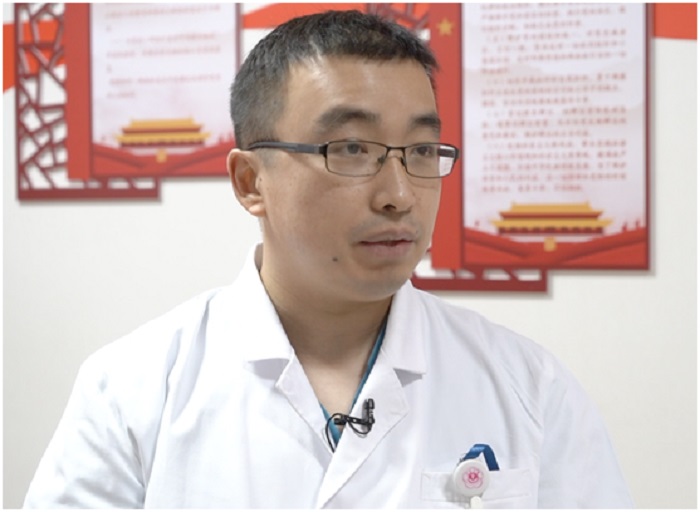



Alpine skiing is a sport that requires both speed and skills. In competitions, alpine skiers can go as fast as 140 kilometers per hour. If athletes get injured in skiing competitions, medical workers must arrive at the scene within four minutes to quickly finish assessment, emergency rescue and transfer of the injured, according to a medical guide issued by the International Ski Federation (FIS).
However, before China’s successful bid to host the Beijing 2022 Olympic and Paralympic Winter Games, the country didn’t have an alpine skiing course that could meet the standards of Winter Olympics, let alone a dedicated medical support team.
In January 2018, the Beijing Organising Committee for the 2022 Olympic and Paralympic Winter Games (BOCWOG) organized a double-board skiing skills test for medical workers in Beijing and north China’s Hebei province, which gathered 232 medical workers from 45 hospitals.
Bai Peng, a post-80s doctor of the anesthesiology department of Peking University Third Hospital in Beijing, got the highest score in the men’s group at the test. Following the test, Bai and more than 70 other doctors formed China’s skiing medical support “dream team” for the Winter Olympics, thus becoming the first-generation ski track rescue doctors in China.
As a veteran ski enthusiast, Bai has enjoyed skiing at ski resorts of different sizes across the country. “I once spent over 40 days in ski resorts in a winter, usually on weekends,” he said. He has obtained the Level 2 ski instructor certificate from Canadian Ski Instructors’ Alliance and an occupational qualification certificate for social sports ski instructor from China’s Ministry of Human Resources and Social Security.
Bai is also a member of the Peking University Third Hospital Ski Club. Led by Zhou Fang, executive president of the Peking University Third Hospital Yanqing Branch, the club has organized many lectures on on-site medical rescue for skiers and ski resort rescue drills, and held China’s first seminar on medical treatment for winter sports injuries.
These activities have made the ski club well-known in the winter sports industry. Medical rooms of ski resorts often ask the club for help when they encounter problems they can’t handle.
Balance is an essential part of skiing. However, it is not easy for medical workers to maintain balance on skis when carrying more than 10 kilograms of rescue pack and automated external defibrillator (AED) on the back and drugs in the arms. Members of the “dream team” often fall down and get injured in training, and several members suffered spinal and ankle fractures and ligament injuries.
First aid on ski track is even more challenging. The main ski run of the Xiaohaituo Mountain in the Yanqing competition zone of the Beijing 2022, where the alpine skiing, bobsleigh and skeleton and luge events will be held, has a total length of 2,950 meters and a vertical drop of 894 meters, which, together with the cold weather, steep slope, and variable wind direction, has made medical rescue in the mountain rather difficult.
To provide better medical services for skiers during the Beijing 2022, members of the “dream team” practiced cardio-pulmonary resuscitation (CPR) on their knees in the snow and lay prostrate and even on their side on steep slopes to try trachea cannula under a temperature of minus 20 or 30 degrees Celsius. They often couldn’t feel their hands and feet after the practice.
Besides high-intensity training in the snow during the day, the team members also spent long hours in the night improving their first-aid plans and work procedures for various contingencies, including rescue operation for patients with chest injuries, emergency treatment for patients with head injuries, as well as emergency airway management for patients with sports trauma.
Athletes with disabilities are different from able-bodied athletes in sports equipment, the ways in which they get injured, and injury examination and treatment.
In the past, the team members didn’t have the faintest idea how to deal with sit-skis used by athletes with lower limb disabilities, according to Bai.
After a great deal of communication with Chinese alpine skiing national team of athletes with disabilities, the team gradually developed a set of effective methods and work procedures for treatment for injuries of alpine skiers with disabilities in ski tracks, Bai disclosed.
“I never expected that a hobby could one day become so useful. It’s all worth it, no matter how hard the job is,” Bai said with pride.
Since he became a member of the “dream team”, Bai has made every endeavor to practice extra hours every snow season in addition to the centralized training arranged for the team. Sometimes he even got bleeding blisters on his legs because of high-intensity practice.
In September 2021, when nearly 10 core members of the team were selected to take part in rope rescue training, Bai, who suffered wrist injury at that time, finished all the training courses with the help of orthosis.
After continuous training and practice during three snow seasons, the “dream team” has become a medical support team recognized by the FIS. It has successfully completed medical support tasks during the test events for the 14th National Winter Games of China and the “Experience Beijing” test events for the Beijing 2022 Olympic and Paralympic Winter Games.
“We are fully prepared to serve the Beijing 2022. But our biggest wish is that all athletes stay safe and get great scores in competitions,” said Bai, who is looking forward to the Games.


The Executive and members of the.


The Acting Director, FCT Directorate of.


President Bola Ahmed Tinubu has been.



Barely a month after resignation of.


An Abuja based Legal Practitioner, Osuagwu.



Convener of Equitable Remedy, Mrs. Magaret.


Contractors handling the contract for city.


Nigerian government may have concluded plans.


The Diplomatic Correspondents Association of Nigeria.


A rights group, “Follow Me Talk.
Leave a Comment